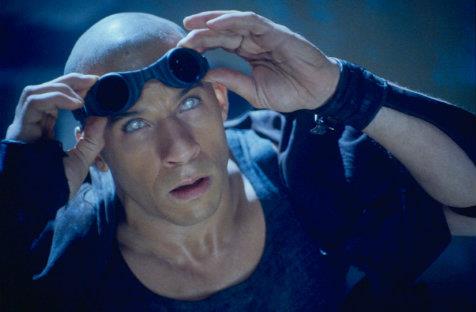Earlier in his career, Vin Diesel plied his trade far and wide, attempting to adapt his particular brand of grizzled, gravelly-voiced gruffness to a variety of styles and genres. Now, with many misses littering his résumé, his focus has shifted to proven properties; indeed, an overview of his past decade in cinema offers only three theatrical releases (A Man Apart, The Pacifier and Babylon A.D.) removed from his two popular franchises.
So it is that Riddick reaches screens, Diesel’s second 2013 outing stemming from established efforts. Unlike Fast & Furious 6, the actor returns to the obvious passion project without the weight of goodwill given the critical mauling 2004’s The Chronicles of Riddick received, and absent the overt audience impetus for a live-action continuation of the tale. Instead, Diesel and returning writer/director David Twohy mould their latest movie upon their greatest strengths: the survivalist story that catapulted 2000’s originating offering Pitch Black to success, and the ability of Diesel to simultaneously brood and do battle.
Accordingly, Riddick rehashes familiar territory as much as it offers its central figure with a stock-standard hero to inhabit. For the former, the film tells of the titular character’s attempt to travel to his home planet after the events of the previous feature, his journey thwarted by a diversion to an abandoned, inhospitable world. For the latter, the protagonist must progress his quest by fighting all manner of creepy computer-generated creatures, not to mention two shiploads of mercenaries sent to return the still-wanted outlaw to incarceration.
In manufacturing a stereotypical scenario that affords Diesel the chance to reclaim Richard B. Riddick as a science fiction titan, the film performs exactly as it intends. Every eventuality of Twohy’s script is crafted to allow his leading man the opportunity to harness his primitive urges, as well as voice his existential struggle; every aspect of Diesel’s performance hinges upon his strong, stoic presence. The imprint of the Western genre is evident, as desolate plains are enlivened with combat between a lone outsider and aggressive interlopers (Killer Elite’s Matt Nable, A Gun in Each Hand’s Jordi Molla, The Hosts’ Bokeem Woodbine, and The Canyons’ Nolan Funk among them). A lukewarm romance also wages with The Haunting in Connecticut 2: Ghosts of Georgia’s Katee Sackhoff, outrageously unperturbed by her character’s same-sex preferences.
Of course, such rote, unrefined construction shows in the end product. Outside of accumulating the expected elements in a paint-by-numbers exercise, little care has gone into their execution. Diesel’s death-defying display of machismo can’t mask the film’s lethargy in the extended gaps between unimaginatively assembled action scenes, the offensive two-dimensionality of Riddick’s uninteresting adversaries, or the Twohy’s lack of energy in offering sci-fi thrills from inexplicably varying perspectives. Consequently, Riddick proves fruitful only in establishing Diesel’s penchant for his protagonist; only the routine and the unremarkable surround his stripped-back starring effort.
Rating: 2 stars out of 5
Riddick
Director: David Twohy
USA, 2013, 119 mins
Release date: September 12
Distributor: Roadshow
Rated: MA
Actors:
Director:
Format:
Country:
Release:





